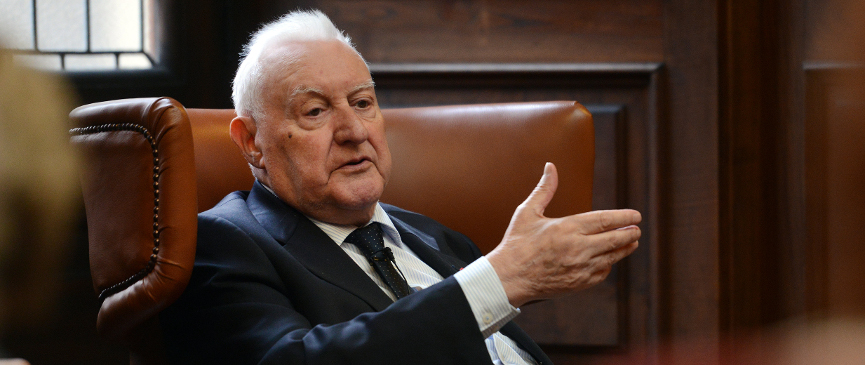You are in:
Laureates
Start of main content
Joseph Pérez
Prince of Asturias Award for Social Sciences 2014

Joseph Pérez (Laroque d'Olmes, Ariege, France 1931 - Bordeaux, France 2020), where his parents had moved from Bocairent, Valencia. He studied Literature at the University of Paris and qualified as a Spanish teacher. He began his teaching career in 1956 at the University of Bordeaux III, where he was to take up the Chair in Spanish and Latin American Civilization in 1960. Linked throughout his entire career to this university, which he was rector of from 1978 to 1983, he is currently Professor Emeritus at the Iberian and Latin American Studies Research and Training Unit. In addition, between 1989 and 1996 he was director of the Casa de Velázquez in Madrid, an institution under the auspices of the French Ministry of Higher Education and Research.
Both heir and successor to the excellent work of figures such as Hispanist and historian of the Anales school Fernand Braudel and other Spanish scholars like Pierre Vilar, he has specialized in the historical period ranging from the reign of Ferdinand and Isabella to Philip II and the formation of the modern Spanish state and the Latin American nations. His actual PhD thesis was published in 1970 under the title La revolución de las Comunidades de Castilla [The Revolution of the Communities of Castile] (1520-1521). This work is considered the most comprehensive analysis to date of the Spanish uprising that took place at the beginning of the reign of Charles I. He published his later studies in the books Los movimientos precursores de la emancipación en Hispanoamérica [Precursor Movements of Emancipation in Latin America] (1977), Isabel y Fernando: los Reyes Católicos [Ferdinand and Isabella: the Catholic Monarchs] (1988), Historia de una tragedia: la expulsión de los judíos de España [History of a Tragedy: the Expulsion of the Jews from Spain] (1993), El humanismo de Fray Luis de León [The Humanism of Fray Luis de León] (1994), Carlos V, soberano de dos mundos [Charles V, Ruler of Two Worlds] (1994) and La España del siglo XVI [Sixteenth-Century Spain] (1998). In 1999, he published La España de Felipe II [The Spain of Philip II] and, together with the Spaniards Santos Juliá and Julio Valdeón, Historia de España [History of Spain]. His works also include Crónica de la Inquisición en España [Chronicle of the Inquisition in Spain] (2002), Los judíos en España [The Jews in Spain] (2005) and La leyenda negra [The Black Legend] (2009), which examines the role of the House of Habsburg, above and beyond Spanish politics, and their influence as the most powerful dynasty in Europe. In 2010, he published Historia de la brujería en España [A History of Witchcraft in Spain] and, in 2011, Entender la historia de España [Understanding the History of Spain]. A contributor to specialist publications, some of his works have been translated into Italian, English, German and Japanese.
He holds an honorary degree from the University of Valladolid, is member of the French Association of Higher Education Hispanists and the Spanish, Columbian and Portuguese Academies of History, and member of the Academy of Fine Arts and Historical Sciences of Toledo. Holder of the title of “Adoptive Son” of Bocairent (Valencia), he was an Officer of the French Legion of Honour, Grand Cross of the Order of Alfonso X the Wise and Commander of the Order of Isabella the Catholic and of the Order of Henry The Navigator of Portugal. In 1991, he was awarded the Elio Antonio de Nebrija International Prize, granted by the University of Salamanca (1986 Prince of Asturias Award for International Cooperation).
End of main content
Sección de utilidades
Fin de la sección de utilidades
- Legal document Legal document (Access key 8)
- | Privacy policy Privacy policy (Access key )
- | Social networks ???en.portal.pie.menu107.title???
- | Cookies ???en.portal.pie.menu110.title???
- | Site map Site Map (Access key 3)
- | Contact Contact (Access key )
- | XHTML 1.0
- | CSS 2.1
- | WAI 'AA
© Copyright 2024. FUNDACIÓN PRINCESA DE ASTURIAS
 Watch interactive
Watch interactive


